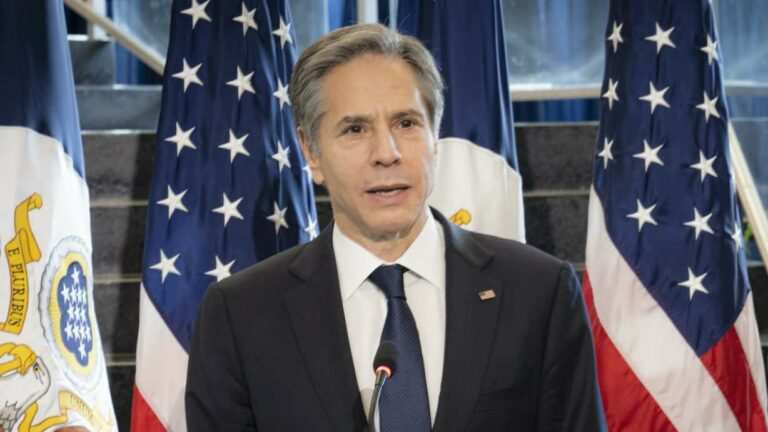
This article was originally published by Radio Free Europe/Radio Liberty and is reprinted with permission.
Ukraine says it will ask NATO to boost military cooperation with Kyiv and prepare economic sanctions as part of a “deterrence package” to prevent Russia from attacking it as U.S. Secretary of State Antony Blinken said Washington has serious concerns that Russia could be planning an invasion.
The comments came as the Western military alliance’s foreign ministers met for a second day in Latvia amid growing concern over a Russian military buildup near the Ukrainian border.
“We are confident that if we join efforts, if we act in a coordinated fashion, we will be able to deter President [Vladimir] Putin and to demotivate him from choosing the worst-case scenario, which is a military operation,” Ukrainian Foreign Minister Dmytro Kuleba told reporters on December 1 as he arrived for talks with his NATO counterparts in the Latvian capital, Riga.
Danish Foreign Minister Jeppe Kofod said that any military operation that would violate the sovereignty of Ukraine would be met with “severe consequences,” and that his country was ready to engage with “heavy” sanctions.
Kofod’s comments echoed stark warnings issued by U.S. Secretary of State Antony Blinken and other foreign ministers of the 30-country defense bloc who on the first day of their meeting said Russia would pay a “heavy price” for any new military aggression against Ukraine, while Moscow cautioned the Western military alliance against crossing its “red lines.”
Ukraine — which aspires to become a member of NATO, a move strongly opposed by Moscow — says Russia has kept tens of thousands of troops and heavy equipment near their common border following massive war games in western Russia earlier this year, raising fears of a possible invasion.
On December 1, Blinken said the United States has serious concerns over “evidence” that Russia could be planning an invasion of Ukraine and warned Moscow it will face drastic economic sanctions if such an attack occurred.
“We’re deeply concerned by evidence that Russia has made plans for significant aggressive moves against Ukraine. Plans include efforts to destabilize Ukraine from within, as well as large scale military operations,” Blinken told a news conference in Riga.
“We don’t know whether President [Vladimir] Putin has made the decision to invade. We do know that he is putting in place the capacity to do so in short order should he so decide,” Blinken said. “We made it clear to the Kremlin that we will respond resolutely, including with a range of high impact economic measures that we’ve refrained from using in the past.”
Blinken said he will tell Russian Foreign Minister Sergei Lavrov on December 2 that Moscow needs to reverse the buildup of its forces near Ukraine. Blinken is set to have separate meetings with Lavrov and Kuleba on the sidelines of an Organization for Security and Cooperation on Europe (OSCE) summit in Stockholm on December 2.
Russia, which seized Crimea from Ukraine in 2014 and backs separatists fighting against Kyiv in an ongoing conflict that has killed more than 13,200 people over the past seven years, has denied it is plotting an attack and blames Ukraine and its Western backers for fueling tensions.
Kuleba said earlier this week that Russia had amassed 115,000 troops and heavy weapons near his country’s border, on the occupied territory of Crimea, and in parts of the two eastern Luhansk and Donetsk regions of Ukraine occupied by Moscow-backed separatists.
The reported Russian military buildup follows a similar surge in the spring, when Moscow gathered around 100,000 troops on Ukraine’s borders but later announced a drawdown.
Russia accused Ukraine on December 1 of “building up its military strength” in the country’s east, and said it had launched its own regular winter drills in its southern military district bordering Ukraine.
Foreign Ministry spokeswoman Maria Zakharova claimed that according to some reports, the number of troops in the conflict zone had already reached 125,000, which she said was “half of the entire Ukrainian Army.”
Kremlin spokesman Dmitry Peskov said Moscow feared Ukraine was gearing up to try to take back the separatist-held areas by force — something Kyiv has denied.
Meanwhile, the Russian Defense Ministry said that its winter drills will involve 10,000 troops across more than 30 training grounds, and would also take place in Crimea and in a Russian region bordering separatist-controlled area of eastern Ukraine.
In an annual address to lawmakers in Kyiv, Ukrainian President Volodymyr Zelenskiy called for “direct negotiations” with Moscow in order to end the war in eastern Ukraine.
“We must talk, knowing that we have a strong and powerful army,” Zelenskiy said, adding that he was “not afraid” to speak directly with Putin.
Peskov reiterated that the conflict was a Ukrainian domestic issue, and that it “can only be stopped through negotiations of Ukrainians with Ukrainians.”
Putin said on December 1 that Moscow wanted serious negotiations with the United States and its allies to extract legal guarantees that would rule out “any further NATO moves to the east and the deployment of weapons systems that threaten us in close proximity to Russian territory.”
“We aren’t demanding any special conditions for ourselves and realize that any agreements must take the interests of Russia and all Euro-Atlantic countries into account,” Putin said. “A calm and stable situation must be ensured for all and is needed for all without exclusion.”
Officials of the alliance and the United States have made clear that no country has the right to veto Ukraine’s NATO ambitions.
0 comments :
Post a Comment